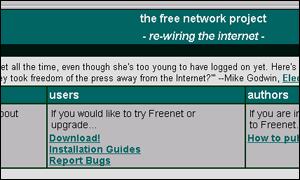| Front Page |
| World |
| UK |
| UK Politics |
| Business |
| Sci/Tech |
| Health |
| Education |
| Entertainment |
| Talking Point |
| In Depth |
| AudioVideo |

The Freenet program is similar to the popular Napster file-sharing software, but uses a different storage and retrieval system which maintains no central index and does not reveal where the files are stored.
There is no way to create a truly censorship-proof system without making copyright enforcement more difficult |
Ian Clarke Freenet project founder |
Freenet project founder Ian Clarke recognises the implications: "One of the characteristics of Freenet is that it allows the distribution of information without any fear of censorship or retribution. This will make it largely impossible to prevent violations of copyright.
"There is no way to create a truly censorship-proof system without making copyright enforcement more difficult, and I personally feel that this is a price worth paying," he said.
Legal deadline
The system's designers say that files held in its network are virtually immune to attack. Sounds, pictures, and documents could be stored and shared without users knowing who put them into the system and where they are actually held at any one time.
Though it is still under development, the Freenet program can be downloaded from the project's website. It does not come with the kind of slick installer that might accompany a more mature piece of software, but it does have an add-on which makes it work with a web browser.
Some users of Napster have sought alternatives following the company's legal setbacks.
The Record Industry Association of America (RIAA) took Napster to court and won a ruling on 5 March saying copyrighted music held without permission had to be removed.
The RIAA sent Napster a list of 135,000 songs, which the file-sharing service has until Wednesday to remove.
Popular files
Users have flocked to systems like Gnutella, but not without problems. Like Freenet, Gnutella has no central index but it does give away IP addresses, which can be used to trace users.
And response times can be slow as the network struggles to cope with thousands of new users.
Freenet should be able to cope with any such surge in popularity because it automatically makes more copies of popular files. Freenet's developers are not fighting writs as yet, but there is no doubt that the music industry is prepared to defend its business.
The British Phonographic Industry, which represents the UK's record companies, says Freenet is not yet a big fish in the file-sharing world, but copyright law should be upheld nevertheless.
"It is the right of creators, whether they are musicians, writers, painters, designers or journalists, to be rewarded for their work. Copyright law is vitally important to ensure that these rights are upheld," a BPI spokesman told BBC News Online.
| Search BBC News Online |
||
Advanced search options | ||
|
| |
|
| |
|
The digital music debate
| ||
|
| ||
|
Analysis
| ||
|
Features
| ||
| ||
The BBC is not responsible for the content of external internet sites
